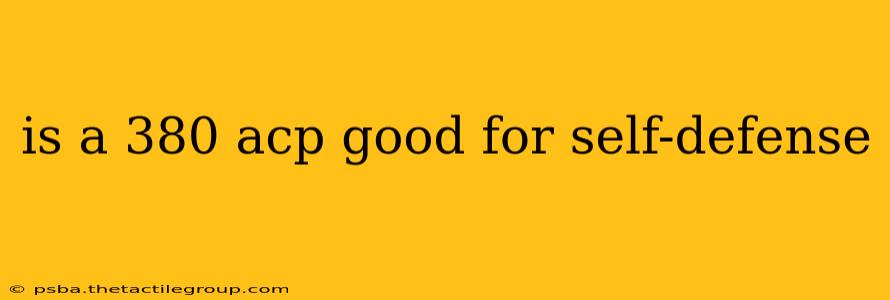The question of whether a .380 ACP (Automatic Colt Pistol) is suitable for self-defense is a complex one, sparking heated debates among firearms enthusiasts and experts. There's no simple yes or no answer, as the effectiveness depends on various factors beyond just the caliber itself. This article delves into the pros and cons, helping you make an informed decision.
Understanding the .380 ACP Cartridge
The .380 ACP is a relatively small cartridge, known for its compact size and manageable recoil. This makes it popular for concealed carry, particularly among individuals with smaller hands or those new to firearms. Its smaller size allows for lighter, more easily concealed pistols. However, this smaller size also directly impacts its performance.
Pros of Using a .380 ACP for Self-Defense
- Concealability: This is arguably the biggest advantage. The compact size of .380 ACP pistols makes them ideal for concealed carry in various situations, offering a degree of discretion crucial for self-defense scenarios.
- Recoil Management: The lower recoil makes it easier to shoot accurately, especially for individuals with less experience or physical strength. This is crucial in high-stress self-defense situations where quick, accurate shots are paramount.
- Ease of Use: Many .380 ACP pistols are designed with features that enhance ease of use, such as lighter triggers and smaller grip sizes, making them accessible to a wider range of users.
- Availability and Affordability: .380 ACP ammunition is widely available and generally more affordable than larger calibers, making it a cost-effective option for regular practice and self-defense.
Cons of Using a .380 ACP for Self-Defense
- Stopping Power: This is the most frequently cited drawback. The smaller caliber and lighter bullet weight generally result in less stopping power compared to larger cartridges like 9mm or .45 ACP. While penetration is adequate for smaller threats, it might not be sufficient for larger targets, or when thick clothing or barriers are involved.
- Limited Range: The smaller cartridge inherently has a shorter effective range than larger calibers. Accurate shots become increasingly difficult at longer distances.
- Penetration Issues: While sufficient for close-range self-defense in many situations, the relatively low energy can result in less penetration than larger calibers, potentially hindering effectiveness against heavily clothed attackers or those behind cover.
Factors to Consider Beyond Caliber
The effectiveness of any self-defense firearm depends on several crucial factors, independent of the cartridge used:
- Shot Placement: Accurate shot placement is paramount regardless of the caliber. A well-placed shot from a .380 ACP can be far more effective than multiple poorly placed shots from a larger caliber.
- Training and Practice: Regular practice and professional training are essential for proficiency and confidence. Knowing how to handle your firearm under stress is crucial for its effective use in self-defense.
- Situational Awareness: Being aware of your surroundings and avoiding potentially dangerous situations is the first line of self-defense.
- Legal Considerations: Gun laws vary widely by location. It's essential to understand and comply with all applicable laws regarding firearm ownership and carry.
Conclusion: Is a .380 ACP Right for You?
The suitability of a .380 ACP for self-defense is subjective and depends on your individual circumstances, experience level, and risk assessment. While it offers excellent concealability and ease of use, its lower stopping power and shorter effective range are important considerations. Weigh the pros and cons carefully, prioritize thorough training, and consider your personal needs and limitations before making a decision. Consulting with experienced firearms instructors and professionals is highly recommended to ensure you select the most appropriate firearm and training for your self-defense needs. Remember, responsible gun ownership is paramount.

